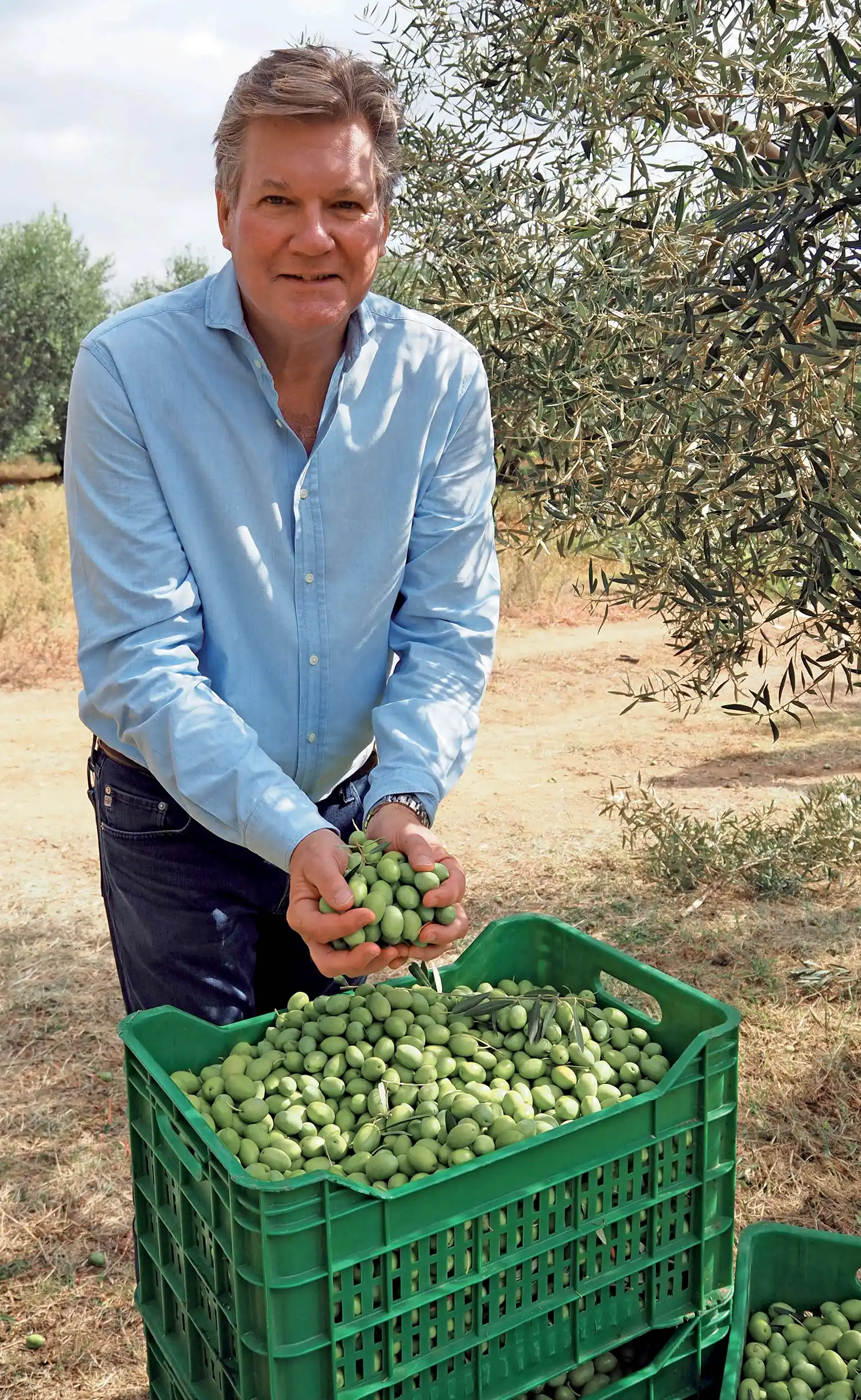
Phil
Meldrum ’79
“There’s an emotional component to food,” says Meldrum. It’s something he realized on one of his early trips abroad. “Europeans have a different experience; they have centuries of traditional production of local food that’s very different than we Americans,” Meldrum explains. “You’ll hear someone say, ‘My local cheese, my local wine is the best in the world.’ There’s a real pride there in their culture and heritage.
“Food is an expression of your experience and what’s important to you and your community. It’s something you are proud of.”
That combination of food, cultural appreciation and honoring agricultural tradition and sustainability is what drove Meldrum to launch FOODMatch, a Mediterranean specialty food importing company, in 1996.
He had a long career in the food industry — from working in restaurants and a gourmet shop in his 20s, to eventually becoming a national sales manager with Hormel Foods.
But a trip to Greece with his wife Chantal in the early 1990s set him on a new path. He was struck by the antiquity and beauty of their surroundings — thinking about the olive trees that had been planted centuries ago, and then sharing a meal with friends around the simple but elegant ingredients of the region.
Much like cheeses are marketed and sold based on their growing environment, what region they come from, and the craft and talent of the cheese makers who create them, Meldrum wanted to bring that same gourmet sensibility to olives.
“Nobody had really approached the olive business in that way, thinking of the best varietals from different countries, working with the best growers,” he says. “I wanted to connect people who enjoy these products with the sources of them. So you have a sense of place when you put a bowl of olives out on the table for a group of friends.”
The Meldrum model brings sourcing down to the growing level to be assured of quality products. FOODMatch buys whole crops of olives and other Mediterranean staples from growers, giving FOODMatch products like the Divina line of olives, spreads and other goods greater transparency, traceability and supply in what Meldrum dubs “grove-to-table” eating.
Food, he believes, is where we connect with others and with history. “Listen, technology is great, you get a quick connection, but the bond you get through food is deeper — you can feel connected to a tradition of community, and tradition of place. In a world that changes so dramatically and so quickly, it’s nice to be connected to things that are a true tradition. People have been harvesting these olives for thousands of years. A couple thousand years ago, Romans were going to buy these olives at Magna Grecia … you feel connected to a human continuum that hasn’t changed very much. You feel part of something bigger than yourself.”
In his last semester as a psychology major, he and a group of friends rented a house on Little Harbor Road, with a kitchen that featured a large fireplace. “I really got into cooking and food then,” he remembers. “My time at UNH inspired me; I think there’s a direct connection with the business I ultimately got into because of my time there.”
He had considered law school, but thought of the profession as people who were “trained to look at life from what can go wrong all the time … I wanted to stay an optimist.”
But for someone involved so closely in agriculture, it can be hard to stay optimistic when thinking about challenges brought on by climate change, Meldrum admits. Take this year’s olive crop, hit hard by two years of severe drought.
“We’re seeing much more frequent violent weather patterns; we are living the result of climate change.”
And his beloved Mediterranean olives aren’t the only example: El Nino in Peru created devastating rains that wiped out whole blueberry crops, dropping the national yield some 51 percent. There were extreme storms and flooding in Greece that destroyed corn, fruit trees and around a fifth of the country’s cotton crop.
KEY INGREDIENTS
- Founder of FOODMatch, Phil Meldrum was recently named the Specialty Food Association’s Leadership Award Winner for Citizenship.
- In 2017, he published “Simply Mediterranean,” a cookbook promoting the Mediterranean diet and the culinary heritage and lifestyle of the region.
- He’s a board member at Oldways Preservation Trust, a nonprofit whose mission is to inspire people to embrace healthier diets through the “old ways” of eating: heritage-based diets like the Mediterranean diet.
That’s where his passion for sustainability comes in. At UNH, he’s been a member of Sustainability Institute’s Advisory Board since 2021. Prior to that, he made a gift to UNH to establish the Meldrum Family Food Systems Fund, which provides support for research and leadership work on regional food system sustainability through Food Solutions New England and the New Hampshire Food Alliance.
Phil has twice served as a delegate for the U.S. Department of State’s Global Entrepreneurship Program. He is also an active angel investor, a member of the California Olive Oil Council, and second vice chair of the Association of Food Industries. In 2018 he joined the board of Frontier Co-Op, a natural spices, extracts and herbs business. He is a board member for The Sylvia Center, which focuses on nutrition education and youth development, and was a member of the Food Council for City Harvest.
He and Chantal have two adult children, and Phil advises today’s UNH students to follow their passions in authentic ways.
“I read an article somewhere that 60 percent of people don’t feel connected to their work. I feel very grateful to be in a business I’m passionate about,” he said.
He realized that passion some 30 years ago, wandering in wonderment among centuries-old olive trees nearly 5,000 miles from home.
“If you connect with people through their heritage, their pride, their history and community … that’s a chance to develop deep human connection … and food is the catalyst for doing that.”